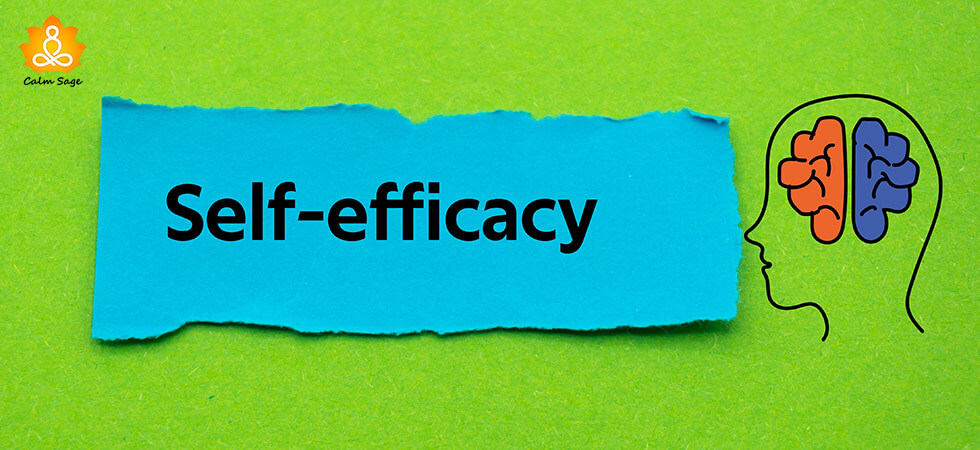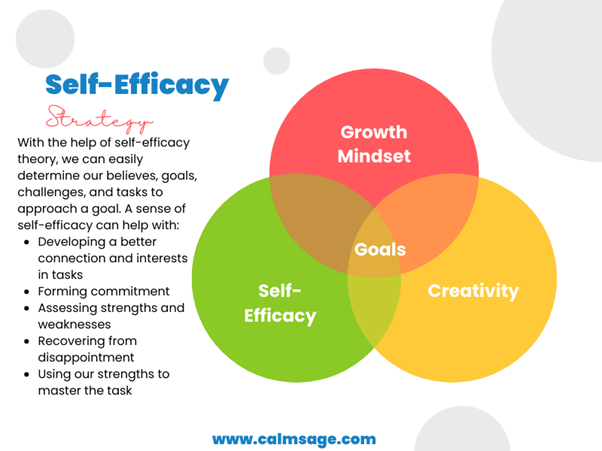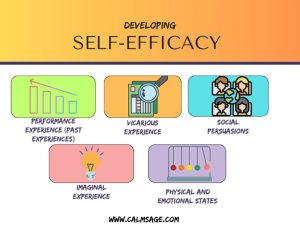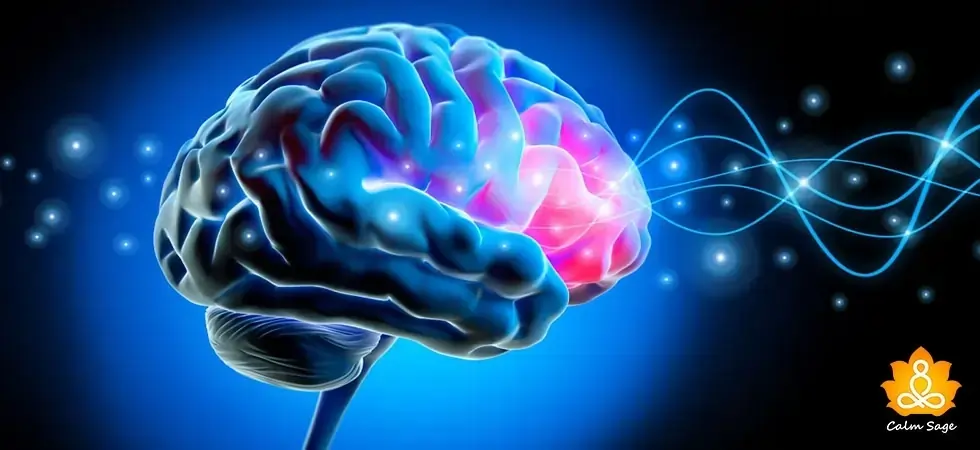Understanding The Importance Of Self-Efficacy: A Building Block To Grow On!

What does it take to complete a task or accomplish a goal?
Motivation?… Abilities?…Skills?
Well, If you ask me, I would have replied, “Belief”. Believing has the power to put everything in its place. When you have faith in your abilities, you can accomplish everything! Self-efficacy is all about believing in your own abilities to meet challenges and overcome obstacles. Self-efficacy revolves around confidence which controls negative behavior and focuses on increasing motivation to accomplish a goal.
Self-efficacy is related to the sense of self-worth; however, these two terms have different meanings. Meanwhile, self-esteem is more centered on “being” and self-efficacy is more centered on “doing.” Self-worth can help improve self-efficacy, but the sense of self-efficacy can improve overall value!
In this blog, let’s uncover the importance of self-efficacy to grow positively and convert your weaknesses to “I think I can, and I will.”
Introduction to Self-Efficacy
Self-efficacy was first introduced and coined by Albert Bandura (Canadian-American Psychologist and Professor at Stanford University) in 1977. He suggested that self-efficacy is essential for improved living because it helps us achieve our goals in life successfully. He described this concept on the basis of social cognitive theory, which is focused on observational learning, and the development of personality with reciprocal determinism.
According to Albert, self-efficacy is the belief in one’s abilities and executing actions to reach goals. Overall, it helps in determining what we think, perform, and feel. Self-efficacy can impact our psychological states which are the main sources of our motivation. To put it in a nutshell, self-efficacy regulates…
- What goals do we want to opt for?
- How do we wish to accomplish them?
- And, most notably, how can we imitate our best performance?
Importance of Self-Efficacy

We all have some goals in our life…when we believe in ourselves, we know how we want to proceed further, what changes we wish to bring, and how we want to achieve things further. However, the reality is that it’s really challenging to put these plans into action. With the help of self-efficacy theory, we can easily determine our beliefs, goals, challenges, and tasks to approach a goal.
A sense of self-efficacy can help with:
- Developing a better connection and interest in tasks
- Forming commitment
- Assessing strengths and weaknesses
- Recovering from disappointment
- Using our strengths to master the task
It’s hard to determine our self-efficacy through theories… let’s explore our beliefs with some examples of self-efficacy:
For example, suppose you are offered a job with new roles and positions that you’ve never experienced, however, your ability to learn and explore your beliefs can help you accept the new job role.
Herein, self-efficacy and positive psychology are related to each other because positive beliefs and recognition of our abilities can help us stick to a goal. Research shows that people who apply the theory of self-efficacy in their life remain motivated, have better outcomes (professionally and personally), remain optimistic, and overcome obstacles and challenges easily.
Now that we have understood the importance of self-efficacy with an example, let us explore how we can develop self-efficacy with the help of psychological theories.
Developing Self-Efficacy in Psychology

We can easily enhance our sense of self-efficacy by understanding some theories and relating them with our experiences related to situations and tasks. However, if you want to evolve, you must learn to attain new skills, understanding, and experiences.
1. Mastery Experiences
Mastery experiences are one of the best ways to develop strong self-efficacy as it allows one to take a look at past experiences and gain new experiences by acquiring new skills. Herein, positive psychology for building self-efficacy comes in because it allows us to reflect on past struggles and motivate us to learn something new.
2. Vicarious Experiences
Vicarious experiences revolve around observing other positive people who have already accomplished a goal. This helps in absorbing positive beliefs about self and helps in reaching goals. Role models could be mentors, leaders, family members, partners, and more.
3. Social Persuasion
Social persuasion revolves around verbal feedback that motivates us to acquire new skills and adapt our abilities to accomplish goals. Feedback could be encouraging or discouraging, converting them into strengths is our self-efficacy!
4. Emotional And Physiological States
The overall well-being of an individual highly influences how they feel about conquering a goal or challenge. For example, social anxiety is one of the common mental health barriers to professional growth. Learning how to manage social anxiety can help you increase your high sense of self-efficacy.
5. Visualization/Imaginal Experiences
This model was suggested by James Maddux in 2013 wherein he provided the development of self-efficacy as a fifth route. In his study, he explained the art of visualization to successfully accomplish goals or any given situation. Visualization is all about portraying our goals as achievable.
Tips to Boost Self-Efficacy
Here’s how you can boost your self-efficacy to reach goals and put yourself on the road to personal growth:
1. Observe others and seek their guidance: In the second route, we explained the importance of vicarious experience which can help you establish and strengthen your abilities. Observing others and seeking their guidance allows us to learn new things from a different perspective.
2. Celebrate your small victories: Whenever you achieve something, reward yourself with something so that you can enjoy the journey and self-motivate yourself to grow positively.
3. Take the help of positive affirmations: Positive feedback makes our day and also improves our sense of self-efficacy. If someone is not doing it for you, do it for yourself and keep motivating yourself through positive affirmations.
4. Focus on your overall well-being: In order to achieve something, it’s important to be in control of your thoughts, emotions, and physical state. Therefore, while you keep an eye on reaching a goal, do not forget to provide your soul with a dose of self-care.
5. Learn new things and keep practicing: To achieve something, it’s important to learn new things and apply them creatively to acquire unique solutions to the challenges.
6. Pursue a positive mindset: A positive mindset can help you reach goals and overcomes obstacles. It helps us make the most of obstacles, learn from mistakes, and recognize our abilities positively.
I hope this blog helps you understand the importance of self-efficacy for accomplishing goals and improving your self-esteem. Comment down and let us know, “What does self-efficacy mean to you?”
For more such content, connect with us on all social media platforms.
Thanks for reading!




















